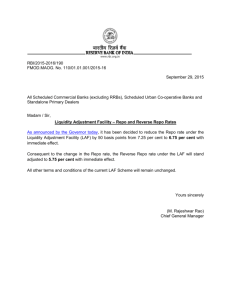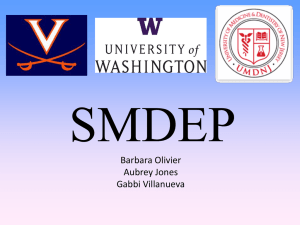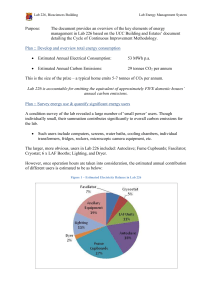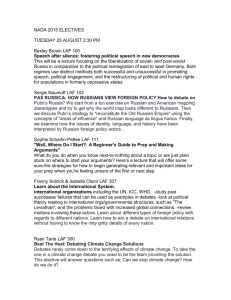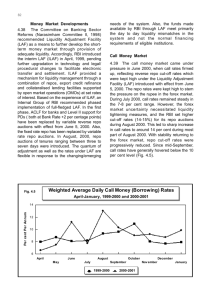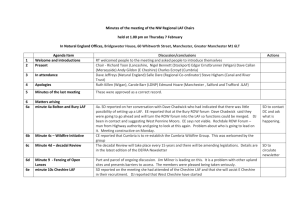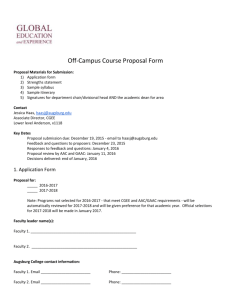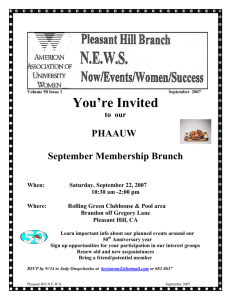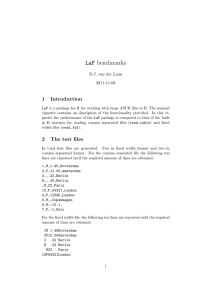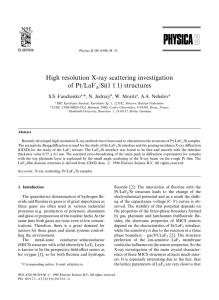Without Really Trying Anyone's Patience
advertisement
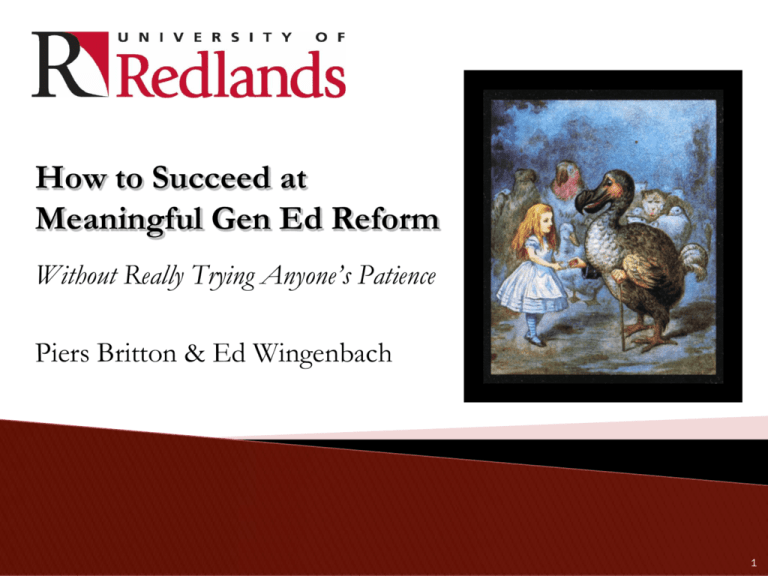
How to Succeed at Meaningful Gen Ed Reform Without Really Trying Anyone’s Patience Piers Britton & Ed Wingenbach 1 • The existent Liberal Arts Foundation: Ostensibly based on modes of enquiry rather than being department/division based – BUT: de facto driven by departmental and other political compromises. CC (Cross Cultural) CP (Creative Process) DD (Dominance and Difference) FL (Foreign Language) HB (Human Behavior) HH (Humanities History) HL (Humanities Literature) HP (Humanities Philosophy) M1 (Science with Lab) M2 (Mathematics) M3 (Math/Science+Lab) SE (State & Economy) WA/WB (Writing Across The Curriculum – Lower & Upper Division) Humanities Philosophy (HP). Philosophical reflection poses fundamental questions about the nature of reality, the possibility of knowledge, and the meaning of life. Courses in philosophy introduce the issues and methods of metaphysics, ethics, logic, and epistemology. They engage students in critical reflection on the presuppositions of other human inquiries, such as art and religion, the natural and the social sciences. Courses in religion introduce the beliefs and spiritual principles embraced by different faiths. All these courses train students in critical and analytical skills and nurture intellectual autonomy by encouraging students to challenge their deepest assumptions. Move to an outcomes-based LAF model which optimizes transparency for: • • • Students – who do not see the LAF as anything more than a hurdle to jump, and are unclear about intellectual goals; Faculty – seeking committee approval for LAF designation; College Curriculum Committee – not necessarily all familiar with each category, but charged with assessing applications for LAF designation. Moreover, intended to facilitate: • • Dissemination/ongoing discussion of learning goals as well as Assessment of student learning. Obstacles: Obstacles: Obstacles: • • • • • • • Collect syllabi for all current courses taught under the given LAF designation; Extrapolate key shared values and concerns; Draft language based on current practice as enshrined in syllabi; Circulate to chairs of all departments in which courses for category are taught, seeking feedback – then revise as necessary; Hold open forum for all interested faculty (stressing communal rather than parochial ‘ownership’ of the LAF) – further revisions; Circulate provisionally agreed language to entire College faculty; Discuss in full Faculty Assembly prior to vote. Humanities Philosophy (HP) Philosophical reflection and investigations of religious thought and practice pose fundamental questions about the nature of reality, the possibility of knowledge, and the meaning of life. Students completing the HP requirement will demonstrate: • an ability to investigate and analyze systems of inquiry and belief; • skills in understanding and investigating philosophical or religious concepts; • a capacity to think critically about their own world views as wells as those of others. Humanities Philosophy (HP). Philosophical reflection poses fundamental questions about the nature of reality, the possibility of knowledge, and the meaning of life. Courses in philosophy introduce the issues and methods of metaphysics, ethics, logic, and epistemology. They engage students in critical reflection on the presuppositions of other human inquiries, such as art and religion, the natural and the social sciences. Courses in religion introduce the beliefs and spiritual principles embraced by different faiths. All these courses train students in critical and analytical skills and nurture intellectual autonomy by encouraging students to challenge their deepest assumptions. Humanities Philosophy (HP) Philosophical reflection and investigations of religious thought and practice pose fundamental questions about the nature of reality, the possibility of knowledge, and the meaning of life. Students completing the HP requirement will demonstrate: • an ability to investigate and analyze systems of inquiry and belief; • skills in understanding and investigating philosophical or religious concepts; • a capacity to think critically about their own world views as wells as those of others. • Gen Ed re-made with full participation of faculty but—by virtue of working from current practice—avoiding inefficient argument over goals and aspirations. • Basis created for evaluation of alignment between rhetoric and actuality, and debate about the desirability of current configuration, as captured in new language. Ed Wingenbach and Piers Britton Sustainable: Minimal demands on faculty time. Student Centered: Direct evaluation of student work. Feedback: Results impact GE requirements. Engaging: Assessment process consistent with faculty culture and values. Reflective Teaching: common and well-established commitment to improving pedagogy through conversations and observation. Faculty Governance: Curriculum and assessment are “owned” and managed by faculty Thus, develop an assessment strategy focused on improving pedagogy and embedded within governance Select one LAF requirement. Faculty teaching this LAF identify one representative assignment. Faculty keep copies of that assignment produced by all students. At the end of the semester, Institutional Research (IR) collects the artifacts. LAF Task Force and IR produce a representative sample of the collected student work for review by faculty teaching this LAF Work sample for each LAF provided to all faculty teaching that LAF, including faculty who did not teach in the spring Professional development meetings scheduled to discuss the LAF. Topics include: ◦ Are students producing the outcomes in their work? ◦ Are outcomes appropriate, as written? ◦ How might we design courses/assignments to help students meet the LAF expectations? ◦ Should the language or outcomes of the LAF be revised? Task Force members take notes, summarize recommendations, collect suggested revisions to the LAF, etc. Task Force produces report, including both an evaluation of student performance in demonstrating outcomes and recommended revisions to LAF. Report distributed first to all LAF faculty for comment, then submitted to Curriculum Committee for action and IR for storage. If changes needed, Curriculum Committee manages the process, including submissions to College Assembly for final approval. All courses with the LAF designation assessed in this cycle must apply for recertification; any courses not approved or not resubmitted will lose LAF status beginning the following semester. Semester S 09 F09 S 10 F 10 State & Economy AC DW FB RC AC DW FB RC AC DW FB RC AC DW FB RC AC DW FB RC Math \ Science II AC DW FB AC=Artifact Collection DW=Development Workshop FB=Feedback RC=Recertification Human Behavior Cross Cultural Creative Process Math \ Science I S11 F 11 S 12 F 12 S 13 RC Semester Individual Faculty Activity S 09 Collect one assignment F 09 Attend one workshop S 10 Comment on report (optional) F 10 Submit LAF application
